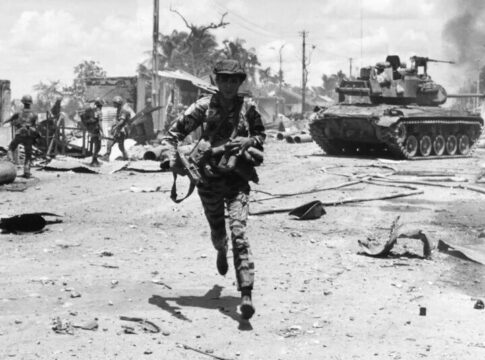Some years are quiet, fading into the history books without much noise. Then there is 1968. It was a year that felt like a decade, packed with enough tragedy, triumph, and chaos to rewrite the American story completely. From the jungles of Vietnam to the streets of Chicago and the silence of the moon, 1968 wasn’t just a collection of events. It was the year the country cracked open, revealing a new, more complicated world. Here are seven ways that 12-month period changed America forever.
The War Came Into Our Living Rooms
In January, the Vietnam War seemed to be grinding along as usual. Then came the Tet Offensive. North Vietnamese forces launched a massive, surprise attack on over 100 cities and outposts in South Vietnam.
While the U.S. military eventually fought back the attacks, the damage was done. Americans watched the brutal fighting unfold on their televisions every night. It shattered the government’s promise that victory was “just around the corner,” fueling a massive rise in anti-war protests.
The Dreamer Was Taken
On April 4, a single shot rang out in Memphis, Tennessee. Martin Luther King Jr., the face of the Civil Rights Movement and a champion of nonviolent protest, was assassinated on the balcony of the Lorraine Motel.
The nation’s grief instantly turned into anger. Riots exploded in more than 100 cities across America, leaving neighborhoods in flames and the country deeply divided. It marked a turning point where the hope for peaceful change began to compete with a growing sense of rage and frustration.
A Final Law for Equality
Just one week after King’s assassination, President Lyndon B. Johnson signed the Civil Rights Act of 1968. Often called the Fair Housing Act, this was a landmark piece of legislation.
It made it illegal to refuse to sell or rent a house to someone because of their race, religion, or national origin. While it didn’t solve inequality overnight, it was a crucial legal victory. It officially declared that the American Dream of owning a home should be open to everyone.
Hope Was Cut Short Again
Two months after King’s death, the nation faced another shock. Robert F. Kennedy, a presidential candidate who many believed could heal the divided country, won the California Democratic primary. Moments after his victory speech on June 5, he was shot.
He died the next day, plunging the political world into chaos. For millions of young people and minorities who saw Kennedy as their voice, his death felt like the final blow to the optimism of the 1960s.
The Whole World Watched Chicago
In August, the Democratic National Convention met in Chicago to pick a presidential nominee. Outside the convention hall, thousands of anti-war protesters gathered to make their voices heard. What followed was a televised collision between the establishment and the counterculture.
Police and protesters clashed in violent, bloody street battles. As cameras rolled, demonstrators chanted, “The whole world is watching!” The chaos exposed deep cracks in the Democratic Party and American society, helping Richard Nixon win the presidency later that year on a promise of “law and order.”
Women Demanded Respect
While men dominated the headlines, women were organizing a revolution of their own. In September, feminists gathered in Atlantic City to protest the Miss America Pageant. They criticized the contest for treating women like objects rather than people.
Demonstrators famously tossed items they considered tools of oppression—like high heels, makeup, and bras—into a “Freedom Trash Can.” It brought the Women’s Liberation Movement into the national spotlight, challenging society to rethink gender roles.
A Christmas Message from the Moon
After a year of violence and tears, 1968 ended with a moment of pure wonder. On December 24, the Apollo 8 astronauts became the first humans to orbit the moon. As they floated in the silence of space, they read from the Book of Genesis and sent a holiday greeting to Earth.
They also captured the famous “Earthrise” photo, showing our bright blue planet rising above the grey lunar surface. For a brief moment, a fractured nation looked up at the sky and felt united, closing a tragic year with a literal new perspective.



Moon landing was a lie.